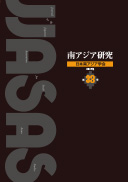Volume 2021, Issue 33
Displaying 1-16 of 16 articles from this issue
- |<
- <
- 1
- >
- >|
-
2022 Volume 2021 Issue 33 Pages 6-36
Published: March 30, 2022
Released on J-STAGE: May 03, 2022
Download PDF (1215K)
-
2022 Volume 2021 Issue 33 Pages 37-64
Published: March 30, 2022
Released on J-STAGE: May 03, 2022
Download PDF (1213K)
-
2022 Volume 2021 Issue 33 Pages 65-72
Published: March 30, 2022
Released on J-STAGE: May 03, 2022
Download PDF (1038K)
-
2022 Volume 2021 Issue 33 Pages 73-78
Published: March 30, 2022
Released on J-STAGE: May 03, 2022
Download PDF (1052K) -
2022 Volume 2021 Issue 33 Pages 79-84
Published: March 30, 2022
Released on J-STAGE: May 03, 2022
Download PDF (1043K) -
2022 Volume 2021 Issue 33 Pages 85-89
Published: March 30, 2022
Released on J-STAGE: May 03, 2022
Download PDF (997K) -
2022 Volume 2021 Issue 33 Pages 90-95
Published: March 30, 2022
Released on J-STAGE: May 03, 2022
Download PDF (1033K) -
2022 Volume 2021 Issue 33 Pages 96-101
Published: March 30, 2022
Released on J-STAGE: May 03, 2022
Download PDF (998K) -
2022 Volume 2021 Issue 33 Pages 102-108
Published: March 30, 2022
Released on J-STAGE: May 03, 2022
Download PDF (1090K)
-
2022 Volume 2021 Issue 33 Pages 109-118
Published: March 30, 2022
Released on J-STAGE: May 03, 2022
Download PDF (1088K) -
2022 Volume 2021 Issue 33 Pages 119-125
Published: March 30, 2022
Released on J-STAGE: May 03, 2022
Download PDF (1080K) -
2022 Volume 2021 Issue 33 Pages 126-130
Published: March 30, 2022
Released on J-STAGE: May 03, 2022
Download PDF (1075K) -
2022 Volume 2021 Issue 33 Pages 131-139
Published: March 30, 2022
Released on J-STAGE: May 03, 2022
Download PDF (1075K) -
2022 Volume 2021 Issue 33 Pages 140-146
Published: March 30, 2022
Released on J-STAGE: May 03, 2022
Download PDF (1080K) -
2022 Volume 2021 Issue 33 Pages 147-152
Published: March 30, 2022
Released on J-STAGE: May 03, 2022
Download PDF (1078K)
-
2022 Volume 2021 Issue 33 Pages 153
Published: March 30, 2022
Released on J-STAGE: May 03, 2022
Download PDF (856K)
- |<
- <
- 1
- >
- >|
